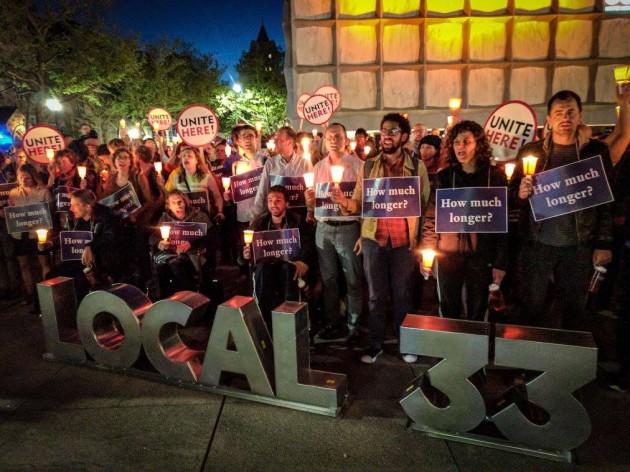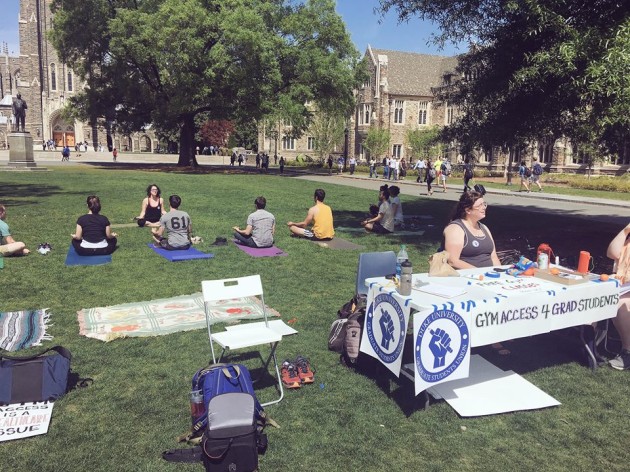The Lilith Blog 1 of 2
June 6, 2017 by Mindy Isser
Jewish Women on the Ramparts for Graduate-Worker Unions

Yale University graduate students at a vigil for the hunger fast. (Photo from Local 33-Unite Here’s Facebook page).
“It’s not something I ever thought I’d have to do to get the university I attend, and work at, to follow the most basic labor law,” said Lena Eckert-Erdheim. She’s a graduate student worker at Yale University, and she’s talking about her eight-day fast, part of the #FastAgainstSlow. Though she wasn’t raised in a religious family, Eckert-Erdheim said that for her “fasting has a spiritual element to it… it’s an act that speaks very powerfully to many traditions.”
Why did Eckert-Erdheim decide to go on a hunger strike? In February, eight of the nine departments at Yale whose graduate student workers voted on whether to join a union, voted yes. However, the administration has refused to acknowledge—let alone negotiate with—the union. Instead, they have appealed the vote to National Labor Relations Board (NLRB). Graduate workers are seeking, among other things, improved child care, better health care, and a sexual harassment grievance procedure. In response to the administration’s continued refusal to negotiate, grad workers at Yale embarked on the hunger strike that Eckert-Erdheim participated in, which lasted until Yale’s commencement on May 22.
These events are all part of a broader picture of graduate worker unionization efforts. This past August, the NLRB ruled that graduate assistants at private universities have the right to unionize. (At many public universities, these sorts of unions have existed for close to 50 years). Since this decision, graduate workers at a number of schools including Brandeis, Harvard, Duke, and Columbia have filed for union elections.
But private universities have been fighting back against unionization efforts, and many have hired outside counsel to assist them in their legal battle against their graduate worker employees. Yale, Columbia, Duke, and the University of Chicago all hired Proskauer Rose, described by Yale history professor Jennifer Klein in a New York Times editorial as “a high-powered law firm that specializes in union-busting, to harass and intimidate the students.”
Many workers get involved in union efforts to improve bread-and-butter issues—wages, benefits, a seat at the table—but Jewish women have a unique tradition of labor struggles from which to draw strength and inspiration that goes well beyond the bounds of traditional workplace organizing. In the early 1900s, immigrant Jewish women, sick of sweatshop conditions, led two mass strikes in New York City, ultimately winning improvements in wages, hours, and conditions. Rose Freedman, a survivor of the Triangle Shirtwaist fire, said that the preventable tragedy occurred because the business owners “thought they were better than the working people. It’s not fair because…money…is more important here than everything… What good is a rich man and he hasn’t got a heart?” These women were the vast majority of workers in the shirtwaist factories, who challenged the conservative leadership of the International Ladies’ Garment Workers’ Union and led their co-workers in the streets.
Despite being plagued by the nasty stereotype of “Jewish American Princess,” Jewish women have in fact long been revolutionary—and now graduate workers at elite universities across the U.S. are carrying the torch.
For Duke University third-year Jessica Gokhberg, participating in the labor movement has been a politicizing experience. “It wasn’t until I started participating in the union effort that I became honestly radicalized, in action rather than just in reading and writing,” she said. When grad workers at Duke hosted free, public exercise classes outside an administrative building in response to the administration’s decision to revoke gym access for grad students after their third year, Gokhberg taught a yoga class because “most [grad students] are radical thinkers, but I had never witnessed any radical desire to take care of one another.” Duke would reverse its decision shortly after the protest.

Gokhberg teaches yoga; Issacharoff at the table. (Photo from Duke Graduate Students Union’s Facebook Page.)
Gokhberg isn’t the only grad student who experienced personal and political growth from organizing her union. “It was really moving for me, and certainly not something I could have done by myself. I really relied on continuous support from my colleagues, other union members at Yale, people who were always coming through 33 Wall Street to keep our spirits up,” Lena Eckert-Erdheim said. “It felt like a very tangible and real way to demonstrate the power of collective action.”
For some, the graduate worker movement has created unexpected intergenerational connections. Abby Scribner, a third-year grad worker at Emory, thought her grandparents would worry about her union activity. Instead, they were proud of her. Scribner’s grandfather told her about “how he had been part of civil rights sit-ins because—in the 1960s—he and my grandma were still being denied housing for being Jewish, and he saw it all as part of the same struggle.” And Duke student Jess Issacharoff said that she just found out that her great-grandmother had been a Polish communist.
“So maybe it’s genetic,” she joked.
Mindy Isser is also a Jewish communist and a union organizer.
The views and opinions expressed in this article are the author’s own and do not necessarily reflect those of Lilith Magazine.
 Please wait...
Please wait...